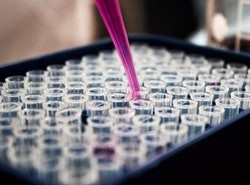
Rational design of a customizable nucleic acid sequence-specific anticancer drug
Published: 10/9/19 1:48 AM
Tim Molloy
Cancer is a disease of DNA. Mutations arising in particular genes result in tumour formation, and subsequent mutations can result in resistance to therapy. There are no drugs which target these DNA mutations themselves however, every cancer drug currently in use instead targets the broad cellular processes to which these mutations contribute to promote tumour growth, such as proliferation, cell division, or in the case of newer targeted therapies, particular protein signalling networks. This approach, in which the symptoms”of a tumour are targeted rather than the DNA mutations actually driving it, can result in treatment failure – for example, tumour cells can effectively escape proliferation-targeting chemotherapy agents simply by temporarily suspending cell division. In addition, patients will often experience significant toxic side-effects as the broad processes being targeted are almost never unique to the tumour cells but also adversely affect normal cells and tissues in the body.
These major shortcomings in cancer therapy are largely due to the fact that until recently, it has not been possible to design a compound that can target a specified DNA sequence directly. Within the last 12 months however, a unique class of bacterial proteins has been made usable in human cells that can do exactly that. This revolutionary new technology has primarily been used thus far to generate new genetically-modified organisms for various biological studies, however we aim to be the first to harness it to develop the ultimate customisable therapy capable of directly treating the specific mutations unique to any tumour.

